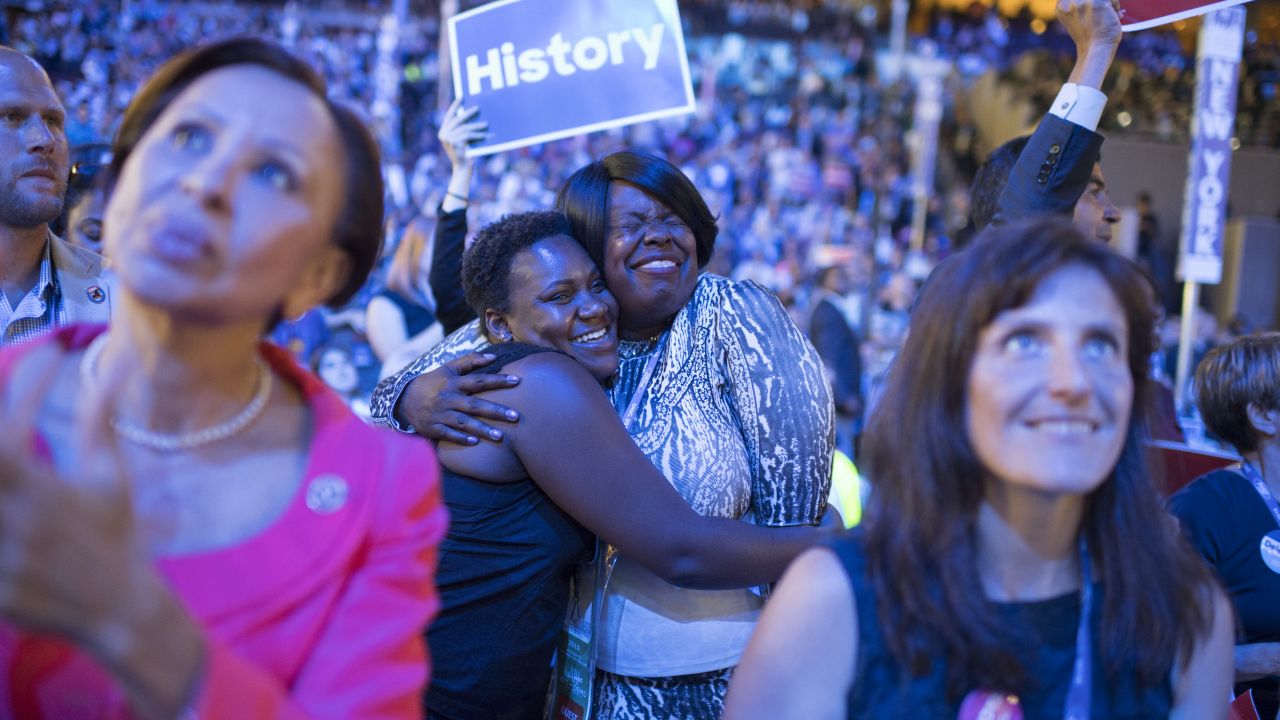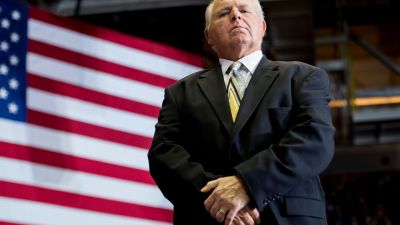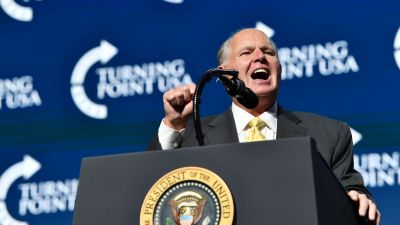
New York delegates dance on the floor of the Wells Fargo Center in Philadelphia on the second day of the Democratic National Convention, July 26, 2016. (Photo By Tom Williams/CQ Roll Call)
The signs said, “HISTORY,” and the media got that part of the Democratic convention right. Many of the pundits remarked that the nomination of the first woman as major party’s presidential candidate didn’t feel like the earthquake that shook the hall (and the nation) when Barack Obama was selected eight years ago, and they were right about that too. Hillary Clinton has been around a long time. Remarkably, she has just about normalized the idea of a woman president, which says a lot about the progress of women in America, and a lot about our relationship to Clinton.
Even so, the media didn’t quite get that last part. In my constant channel-surfing last night, I didn’t hear a single analyst remark on the common assumption: Like her or hate her, Clinton is, by general consent, so obviously qualified to be president that we don’t consciously think much about the fact that she is a woman — unless, as we were last night, we are reminded of it.
But there was another history last night, and it formed the basis of the evening. That was Clinton’s own history. Speaker after speaker took the stage to describe her accomplishments. (I thought it telling that she had a grade-school friend there — telling because Donald Trump, as I recall, didn’t have any testimonials except from his children and a business associate. His life seems to reach back only as far as his celebrity.)
Of course, the big Hillary Clinton historian was Bill Clinton himself, in full storytelling mode, as he described how he met her, courted her, married her, raised a family with her and has deeply admired her.
There have been several decades’ worth of head scratching over what makes this relationship tick. I am not sure Bill Clinton got us any closer to the answer. But as he discussed his wife’s passion and compassion, her indefatigability, her smarts, her moral compass, I thought of Robert Redford and Barbra Streisand in The Way We Were, and that great scene in which Redford’s college chum, played by Bradford Dillman, breaks the news that he and his gorgeous college sweetheart, Carol Ann, are getting divorced. Redford commiserates. (Unable to meet the moral demands of his own wife, Katie, he has had an affair with Dillman’s.) But then Dillman delivers one of the most powerfully romantic lines in the history of movies, in large part because it addresses a kind of romance that the movies seldom ever touch: the romance of substance. He says, speaking of Redford’s wife, Streisand, a political firebrand and moral tiger, “It’s not like losing somebody. Katie — that would be a loss.” Again, whatever you think of Hillary Clinton, you know that Bill Clinton knows that losing her would be a loss.
Most pundits praised Bill Clinton’s speech. But in doing so, they also inadvertently condemned themselves. One after another they said how much they didn’t know about Hillary Clinton, including how much of her life she had devoted to social justice long before she and Bill were married and long before she had thought of a political career. He cited how young Hillary Rodham pooh-poohed his idea that she should be the one to enter politics. In a way, she was right about herself. She was too much like Streisand’s Katie Morosky, too much a steamroller, to engage in all the glad-handing of politics that her husband mastered. In fact, she still doesn’t seem to understand it.
Why didn’t the media know about Hillary Clinton’s history? She has been on the national scene for 25 years. She has written memoirs, and there are a number of biographies of her, including a fat one by Carl Bernstein. As guarded as she is, it is not exactly as if her life is a secret. You would think that anyone covering this election would have boned up on her and on Trump, for that matter, to have read everything there is to read on both, to have attempted to figure out the forces, psychological and otherwise, that brought both candidates to this point. To admit you didn’t is a grave dereliction bordering on cause for firing. We seem to know most of the Trump story, perhaps because there is less to know. The oddity is that we don’t seem to know Clinton’s.
Moreover, we shouldn’t be getting her story from the Democratic convention — or at least not only from the Democratic convention — where the deck is obviously stacked in her favor. Where are the 10,000-word Clinton and Trump magazine profiles? Where are the grand excavations into their lives? Where is a Norman Mailer when you really need him? Maybe those long analyses are coming — but if so, it’s a little late in the game.
One more thing: MSNBC’s Lawrence O’Donnell claimed that the stories last evening “connected us to the Hillary Clinton who is really hard to see now.” But the reason she is hard to see now is not because Clinton is so wary of the press and conceals herself. She is wary because of the way the press has continued to bash her, again and again and again. No, the reason she is hard to see is because the press has not only neglected to tell the story of the dedicated Hillary Clinton; it has insisted on telling a counter-narrative of a woman who is deceptive and self-interested. I have no confirmation of who the “real” Hillary Clinton is, Bill Clinton’s endorsement notwithstanding, but the story has been pretty one-sided until now so that, as O’Donnell put it, we can’t even see the old Hillary Clinton. For that, we have the media to blame.
Sometimes heroes fall hard. Sometimes they fall more lightly. I take a backseat to no one in my admiration for Stephen Colbert, but he is a victim of my own adage: Nothing fails like success. The Comedy Central Colbert, tucked away with his smallish, devoted, young, liberal audience, may have wielded the most cutting political skewer of our times. Night after night, he disemboweled both the media and the politicians — our Voltaire, Twain, Will Rogers and H.L. Mencken rolled into one. (See, I told you I loved the guy.) He was so successful, of course, that CBS elevated him to David Letterman’s chair.
And that is where the trouble began. First, he shed his blowhard, Bill O’Reilly manqué persona. The real Stephen Colbert turned out to be a sweet softie. Then he blunted that skewer. (Watching Jon Stewart on the show last week was like revisiting political Valhalla.) Oh, he takes plenty of digs at Trump (and at Clinton), but his is a different show now for a different audience, and he is not about to offend every Trump voter, which is exactly what I suspect he would have done back on The Colbert Report. That Colbert couldn’t be intimidated. This one is already hearing rumors of being edged aside by James Cordon. You don’t get emboldened that way. You fall lightly.
Case in point, last night’s show. The iron law of popular culture is that whatever originates on the margins as a challenge to official culture ultimately moves to the center where, more likely than not, it gets co-opted. Last night, Colbert had a cartoon Hillary Clinton, all pasted smiles and robotic arm gestures, as a guest. There is no reason why she should be spared lampooning. God knows there are a lot of things about her to lampoon, not least of all her reticence. But this time Colbert was tone deaf. His Hillary Clinton was programmed, phony and, of course, a liar. It was Clinton = Trump, which, again, is perfectly OK if you really feel that their sins are equivalent. To me, though, it felt as if Colbert had capitulated. He was now a tit-for-tat man — a CBS man rather than a Comedy Central man.
If you want to see some of the brio of the old Colbert, you might want to tune in Seth Meyers on NBC. Scolding the “Bernie or Busters,” Meyers said “bust won,” and then described why Trump could win the election: “Remember that crazy uncle you only saw at Thanksgiving? Well, this country is about 48 percent crazy uncles, and it’s about to be Thanksgiving all day, every day.”
When we talk about the transformation of news into entertainment, one of the things we are talking about is the transformation of the newsman into the reality TV star. This was what took down former NBC Nightly News anchor Brian Williams. He couldn’t adequately navigate the line between newsman and celebrity, which, in fairness, was not a line that most previous newsmen had to navigate.
Williams is now relegated to hosting duty on MSNBC, where he performs with one of the most egregious of the reality news stars, Chris Matthews. Matthews understood the direction of TV news long before most of its practitioners did, and you could think of him as kind of a pioneer. He is, first and foremost, a character. He doesn’t sell analysis, most of which is negligible at best. He sells personality. He is the logorrheic guy on the barstool, the guy talking so fast that his tongue outruns his brain, the guy you would like to get away from because he is in your face but who won’t let you leave. It is an Irish-American working-class persona — the late Tim Russert sold a similar one — and it seems phony when a guy is making millions.
Still, phoniness isn’t the real problem with the journalist-as-character. The problem is that journalism invariably gets sacrificed to character. So many of these political pundits are so busy generating their personas and branding themselves that they seem to forget they are allegedly serving a journalistic service. Do we really want a guy on a barstool issuing pronouncements or would we prefer someone who doesn’t play at being an analyst, but really is one? Or put it this way: When you can’t distinguish the bragging, outsized journalists from Trump, you have got a big problem.




